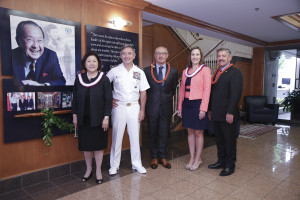
The Daniel K. Inouye Asia-Pacific Center for Security Studies crafted this memorial to pay tribute to its founder and namesake the late U.S. Senator Inouye. The Center completed the display shortly before today’s 20th Anniversary celebration. Pictured left to right are President of the U.S.-Japan Council Irene Hirano Inouye (widow of Senator Inouye), Commander of U.S. Pacific Command Adm. Harry Harris, Jr., New Zealand Counsel-General for Hawaii Ambassador Robert Kaiwai (representing DKI APCSS alumni), Principal Deputy Assistant Secretary of Defense for Asian and Pacific Security Affairs Kelly Magsamen, and DKI APCSS Director Lt. Gen. (Ret) Dan Leaf.
See Also: DKI APCSS plays key role in U.S. collaborative approach to Asia-Pacific stability
HONOLULU — Celebrating 20 years of building peace through education, the Daniel K. Inouye Asia-Pacific Center for Security Studies held a ceremony today honoring its achievements and its namesake, the late U.S. Senator Inouye.
Nearly 400 people attended the commemoration at the Center located at Fort DeRussy in Waikiki. Among honored speakers were Commander of U.S. Pacific Command Adm. Harry Harris, Jr., President of the U.S.-Japan Council Irene Hirano Inouye (widow of Senator Inouye), Principal Deputy Assistant Secretary of Defense for Asian and Pacific Security Affairs Kelly Magsamen, and representing the DKI APCSS alumni, New Zealand Ambassador Robert Kaiwai. Four members of Hawaii’s U.S. Senate and House delegation provided comments via pre-recorded video.
Attendees gathered to honor the organization’s success over the last two decades in promoting multilateral collaboration and problem-solving among Asia-Pacific security practitioners. The Center has engaged nearly 10,000 Fellows from more than 100 nations. Its education and outreach programs have helped nations form enhanced policies and procedures that lead to more effective governance, greater stability and heightened resiliency.
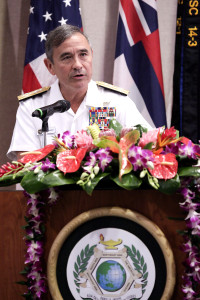
Commander of U.S. Pacific Command Adm. Harry Harris, Jr., provides remarks at today’s 20th Anniversary celebration of the Daniel K. Inouye Asia-Pacific Center for Security Studies. Harris paid tribute to the late U.S. Senator Inouye and honored the Center’s contributions to regional security.
“This was an opportunity to acknowledge the people – past and present – who have made DKI APCSS an extraordinarily effective proponent of good governance and security cooperation,” said Lt. Gen. (Ret) Dan Leaf, Center director. “At the same time, we paid tribute to our namesake, Senator Daniel K. Inouye, and his vision for the Center and reminded ourselves that being in Hawaii is a blessing and tremendous advantage. Twenty years of growth and accomplishment have set the stage for a very bright future.”
U.S. Sen. Brian Schatz added that today’s commemoration was a “fitting tribute” to Senator Inouye’s legacy. “His vision and work helped to build the Center into the respected institution it is today,” the senator said, adding, “He was a strong supporter because he recognized early on that the Asia-Pacific region would be a key to America’s security, and that Hawaii was critical to our engagement in the region.”
DKI APCSS activities are designed to meet Department of Defense and U.S. Pacific Command strategic objectives for the region. Those objectives center on a more secure, stable and prosperous region as envisioned by Inouye.
A sampling of the Center’s regional contributions included development of new national security strategies in Papua New Guinea, the Philippines, and Timor-Leste; implementation of earthquake preparation plans in Nepal and New Zealand; formation of strategies to deal with regional biosecurity threats; and improvements in multilateral cooperation throughout the region, even between nations with long-running political and cultural rivalries.
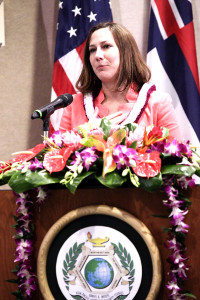
Kelly Magsamen, principal assistant secretary of defense for Asian and Pacific security affairs, addresses attendees at today’s Daniel K. Inouye Asia-Pacific Center for Security Studies 20th Anniversary celebration. She honored the Center’s role in building cooperation among regional security leaders through open dialogue and information sharing.
“Since 1995, DKI APCSS has served as a strategic epicenter of learning; it is a proving ground for global security ideas and a catalyst for building international relationships,” said U.S. Sen. Mazie Hirono via pre-recorded video. “Like the man it is named after, it is solutions-driven…constantly searching for ways to produce successful outcomes regardless of the challenges at hand.”
From the floor of the U.S. House of Representatives, U.S. Rep. Mark Takai emphasized the Center’s strategic importance.
“As the U.S. shifts its focus to the Asia-Pacific region, the DKI Center is uniquely situated to play a critical role in driving our nation’s security policy. As I have witnessed firsthand, the Center is focused on producing results. This will be crucial as we move forward with the rebalance and begin to tackle pressing security related issues.”
U.S. Rep. Tulsi Gabbard praised the Center’s high-impact outreach. “Over time, thousands of leaders from around the world have walked through your halls sharing conversations about security concerns within the Asia-Pacific region and how best to work together to solve them. As a result, we’ve seen evidence time and time again that these same leaders have gone on to bring about solutions to the challenges that exist on the ground.”
The Center exists thanks, in large part, to Inouye pursuing his vision. After visiting the Marshall Center in Germany, he advocated for a similar facility in Hawaii — one that would bring the region’s security minds together to share ideas and form professional relationships, all in the interest of peace. He introduced legislation to establish the Center in September 1994, and President William Clinton signed it the same year, approving $3 million for its creation.
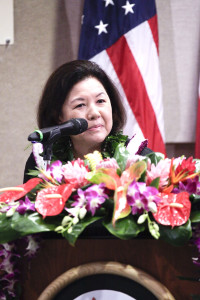
: Irene Hirono Inouye, president of the U.S.-Japan Council and widow of the late U.S. Sen. Daniel K. Inouye, honors her husband’s legacy of promoting peace in the Asia-Pacific region and envisioning a center that would facilitate international security collaboration. That Center, the DKI Asia-Pacific Center for Security Studies celebrated its 20th year of operation today.
A year later, on Sept. 4, 1995, the Asia-Pacific Center for Security Studies stood up in temporary space at the Waikiki Trade Center. The Center’s staff conducted the first course — Executive Course 96-1 — in September 1996. Twenty-three Fellows from 12 nations took part in the 12-week curriculum focused at the national policy level on factors impacting regional security.
Twenty years later, the Center has evolved to address the latest trends in environmental, defense, socio-economic, cultural and political issues through six core courses and a myriad of workshops. Center faculty members facilitate discussions on topics ranging from counterterrorism and combatting transnational crime to preparing for and mediating crises, such as natural disasters and pandemics. All are accomplished within the context of three driving principles: transparency, mutual respect and inclusion.
DKI APCSS is one of five Department of Defense regional security education centers. Its primary mission is to educate, empower and connect leaders to equip them with skills needed to affect positive change in their workplaces, communities and nations.
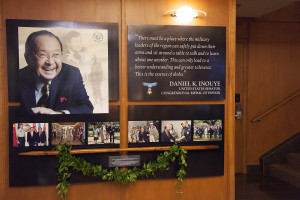
The Daniel K. Inouye Asia-Pacific Center for Security Studies crafted this memorial to pay tribute to its founder and namesake the late U.S. Senator Inouye. The Center completed the display shortly before today’s 20th Anniversary celebration.
-END-


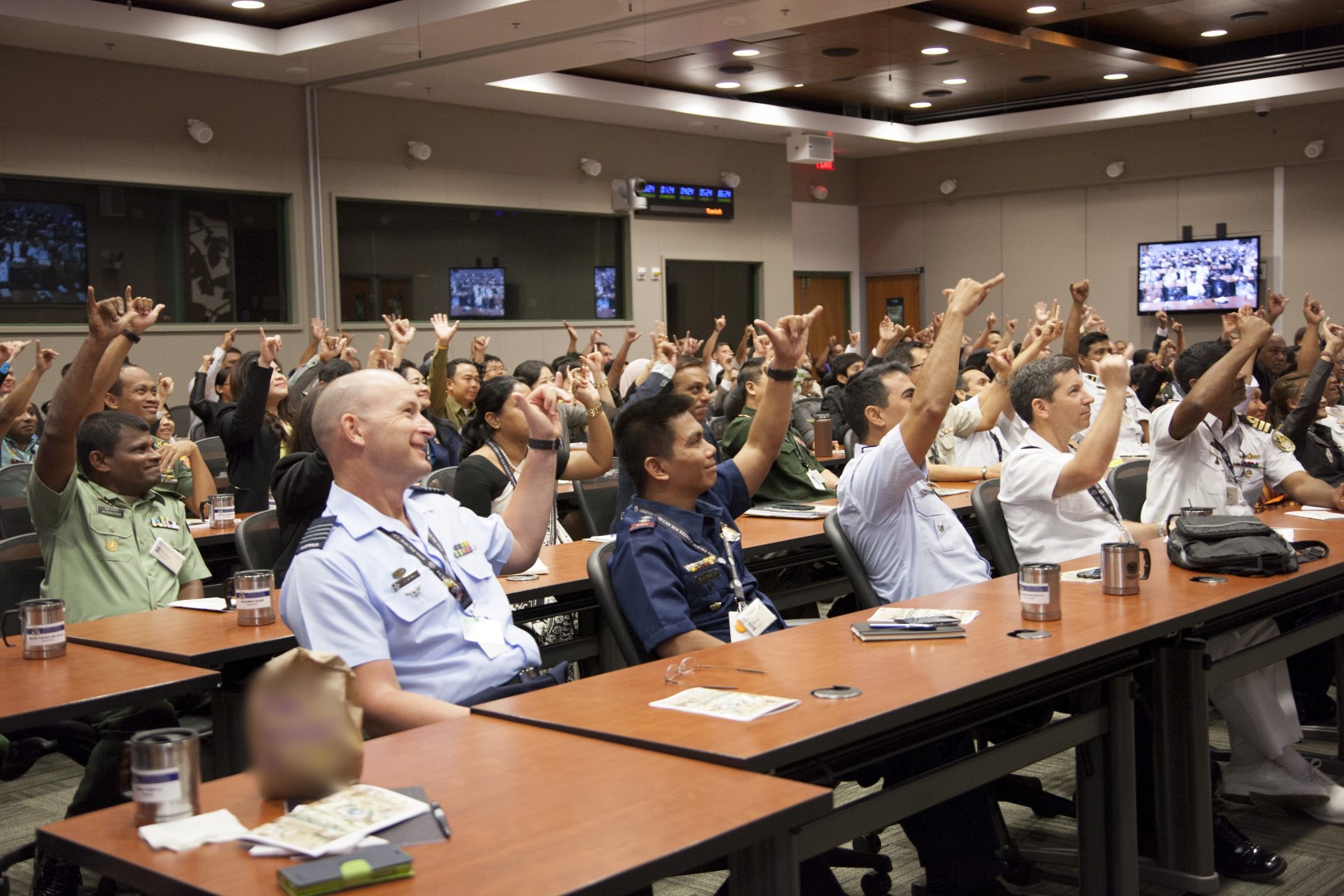

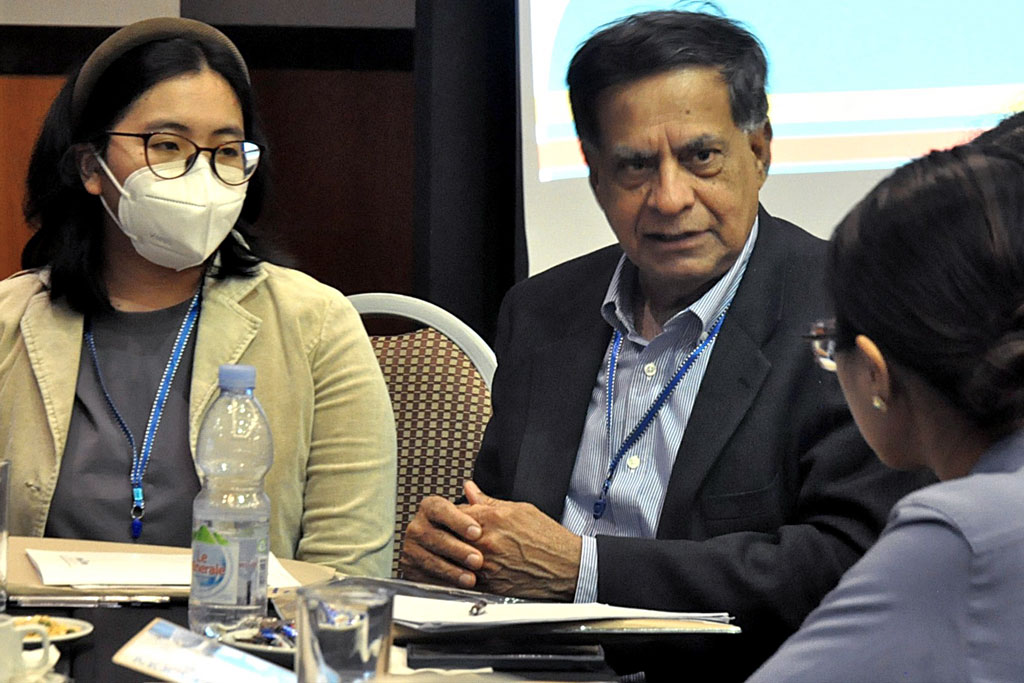
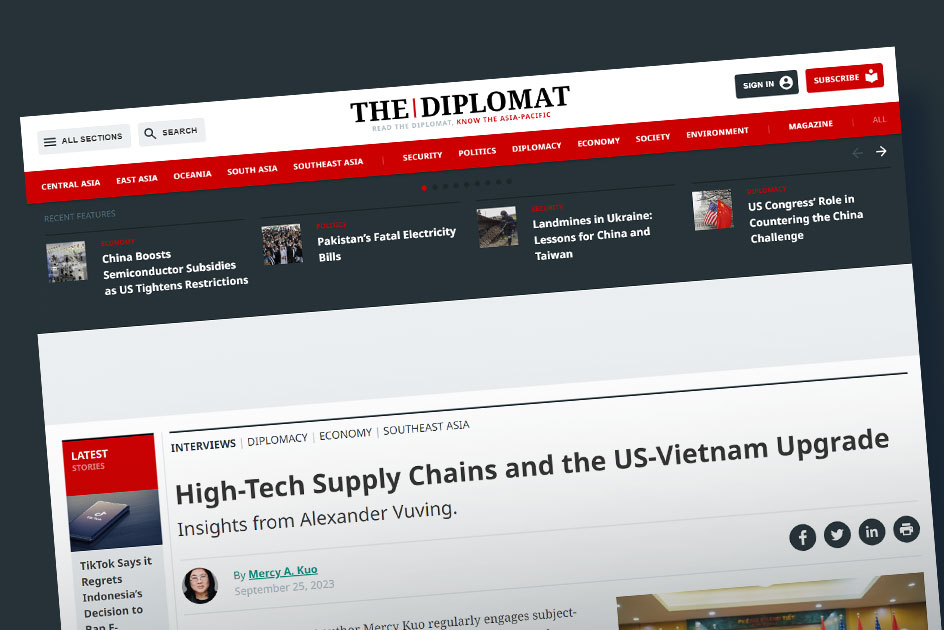




Leave A Comment